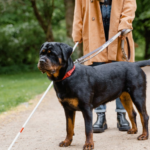As our beloved Rottweilers become older, they may develop chronic health problems that have a negative influence on their quality of life. As responsible pet owners, we must recognize the various problems that might afflict senior Rottweilers and know how to successfully treat them. Whether your Rottweiler is just entering its golden years or is already a senior, this article will teach you how to keep your furry friend happy, healthy, and comfortable as it ages.
Managing Chronic Pain in Senior Rottweilers: Medications and Therapies
Chronic pain in elderly Rottweilers may be difficult for pet owners to manage. As our pets become older, they may develop chronic pain from diseases including arthritis, hip dysplasia, and degenerative joint disease. Fortunately, there are various drugs and treatments available that can assist ease chronic discomfort and enhance our older Rottweilers’ quality of life. There are many medications, such as nonsteroidal anti-inflammatory drugs and opioid pain relievers, as well as alternative treatments, such as acupuncture and massage, that may be used to manage chronic pain in senior Rottweilers. It is also necessary to work together with a veterinarian to develop a personalized treatment plan that suits your pet’s individual requirements.
Managing Incontinence in Old Rottweilers
A decline in muscle tone, nerve function, or hormone abnormalities are the major cause of incontinence in old Rottweilers. There are numerous reasons for incontinence in older Rottweilers, as well as treatment alternatives including medication, bladder control exercises, and nutritional adjustments. It is also important to work with a veterinarian to develop an individualized treatment plan that matches the specific needs of the aging Rottweiler. It should be noted that incontinence may be an indication of various underlying health conditions, thus it is important to check with a veterinarian to rule out any underlying disorders.
How to Supporting Old Rottweilers with Mobility Issues
Supporting old Rottweilers with mobility issues needs both physical and emotional care. Physically, providing a pleasant and safe living environment, such as a non-slip surface and easy access to food and water, is critical. Regular vet check-ups and medication management may also help them manage any pain or discomfort. To preserve muscular strength and flexibility, it is critical to give low-impact exercises such as mild walks or swimming. Furthermore, having a supportive and comfortable bed may aid in the prevention of pressure sores. Emotionally, it is important to shower them with love and attention, as well as make any necessary changes to their routine to reduce tension and worry. Activities like obedience training and grooming may also assist to keep their minds occupied.
Dealing with the Emotional Aspects of Caring for an Old Rottweiler
It might be challenging to deal with the emotional side of caring for an old Rottweiler, but it is important to give them love and care during their golden years. Rottweilers’ physical and mental capacities may deteriorate as they age, leading to behavioral changes and a decrease in general quality of life. It is critical for caregivers to recognize these changes and make any necessary adjustments to their routines to reduce anxiety and stress. Providing a comfortable and familiar living environment, participating in activities like obedience training and grooming, and spending quality time with them, for example, might assist to keep them mentally active. Furthermore, it is important to be patient and sympathetic since they may need more time to do some duties and may be more prone to accidents. It is also critical to provide emotional support and comfort as they reach the end of their lives, which may be a trying period for both the Rottweiler and the caretaker.
Final Thoughts
In conclusion, managing chronic health problems in old Rottweilers is important for keeping their quality of life throughout their golden years. Regular vet visits, medication management, and lifestyle adjustments such as providing a comfortable environment, low-impact exercise, and a balanced food may all help in the management of pain and discomfort. It is also important to provide emotional support and comfort. As a caretaker, you must be patient, empathetic, and flexible to the changes that accompany aging. Senior Rottweilers may enjoy happy and healthy lives in their golden years with appropriate care and supervision.







